The case of "Crimean terrorists." Sentence passed
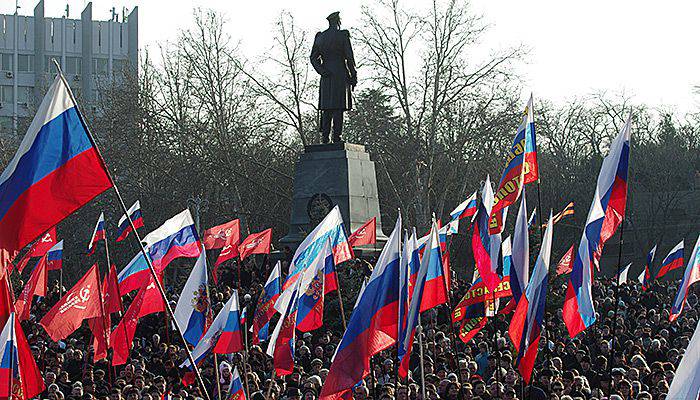
Russian Crimea and its opponents
After a violent change of power occurred in Kiev as a result of the riots in Kiev and President Viktor Yanukovych was forced to leave the country, popular protests also began in Crimea. However, unlike Kyivans, Crimeans did not welcome the establishment of a new government, but opposed it, because they feared the further growth of Russophobia in Ukrainian society and the adoption of laws that discriminated against the Russian and Russian-speaking population. More and more loudly voices began to be heard about the need for the Crimea to leave Ukraine, since in the latter a coup d'état occurred. In January, 2014 in Crimea began the mobilization of activists and sympathizers of Russian social and political organizations, who declared their desire to prevent the establishment of “Nazis” and “Bandera’s” power over Crimea. Detachments of activists began to take control of the main administrative buildings of the Crimean cities, and between 23 and 27 in February 2014 a complete change was made in the leadership of the executive authorities of the city of Sevastopol and the Autonomous Republic of Crimea. After that, the new Crimean authorities declared the illegitimacy of the Kiev regime and asked for help and assistance from the leadership of the Russian Federation. 27 February in Crimea began the movement of armed people, later Russia conducted a peacekeeping operation, the main purpose of which was to ensure the smooth holding of a referendum on the reunification of the Crimea with the Russian Federation. 16 March 2014 was held a referendum in which 89,5% of the inhabitants of the Crimea and 95,6% of the inhabitants of Sevastopol spoke in favor of joining the Russian Federation. So Crimea and Sevastopol became part of the Russian Federation as new subjects that made up the Crimean Federal District.
Naturally, when the population of Crimea for the most part supported reunification with Russia, and with the support of the Cossacks, volunteers and “polite people”, bloodshed was avoided and the Crimean people expressed their peaceful will, Ukrainian nationalists became more active on the territory of the peninsula. Initially, the Kiev regime tried to act by inciting ethnic hatred on the peninsula, setting the Ukrainian and Crimean-Tatar population against reunification with Russia. But, despite the spread of anti-Russian sentiment among some of the Crimean Tatars and Crimean Ukrainians, Kiev failed to win the support of the majority of representatives of these ethnic groups of the Crimean population. Since the absolute majority of the Crimean people did not support the Maidan and reacted negatively to the new Ukrainian government, opponents of reunification of the peninsula with Russia could only proceed to all sorts of subversive and extremist actions. For this purpose, Kiev could only be used by Ukrainian nationalist organizations operating in the Crimea. Their backbone was scarce and consisted of intellectuals and radical young people who did not enjoy the support of broad sections of the population. The proponents of preserving Crimea as part of Ukraine could not oppose the will of the overwhelming majority of Crimeans, as evidenced by the absence of any significant protest actions against the reunification of Crimea with Russia. Representatives of a number of Ukrainian radical organizations began to openly call for sabotage on the territory of Crimea.
Initially, the anti-Russian forces in the Crimea started out small - for example, the Avtomaydan movement activists organized the supply of food for the military personnel of the Ukrainian military units stationed on the peninsula. However, further political events in the Crimea showed that many Ukrainian servicemen would be more willing to continue serving in the Russian armed forces than to remain loyal to the Kiev regime. The rest of the Ukrainian military was given the opportunity to leave the Crimea. After the withdrawal of Ukrainian troops disagree with the reunification of the Crimea and Russia, Ukrainian nationalists decided to proceed to the protests against the new status of the peninsula. Apparently, some representatives of the Ukrainian nationalist movement decided that simple pickets with posters to express their opinions would not be enough. 14 April 2014. Unidentified persons threw a petrol bomb into the window of the office of the Crimean Republican branch of the United Russia party in Simferopol. A similar sortie was made the same night against the office of the “Russian community of Crimea”. Naturally, law enforcement agencies and special services could not but respond to these actions by unknown perpetrators, since the provocative political nature of the crimes was obvious. The development of a circle of possible suspects has begun. It should be noted that activists of pro-Ukrainian nationalist organizations operating in Simferopol immediately fell under suspicion. During May 2014 in Simferopol, officers of the Federal Security Service of the Russian Federation detained several people suspected of involvement in the commission and preparation of terrorist acts in the city.
The game of saboteurs failed
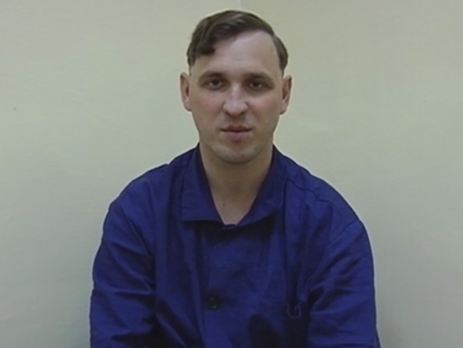 History identifying the underground group began with the fact that one Aleksey Chirniy (in the photo) asked his acquaintance Alexander Pirogov, who was well versed in chemistry, to make an explosive device. However, that unnecessary problems were not needed, and he turned to the security authorities, after which he met with Chirniy under cover. According to the operatives, Chirniy and his comrades were going to lay down an 9 explosive device in May 2014, on Victory Day in the Great Patriotic War, under a monument to V.I. Lenin, and another device - under the memorial to the heroes of the war. Alexey Chirniy was born in 1981 year, that is, at the time of the preparation of the terrorist act, he was an adult, thirty-three years old man, besides - with a higher historical education. And not just with education - but with the degree of candidate of historical sciences and the work of a teacher at the Simferopol Institute of Culture. A native Crimean, he long ago sympathized with the Ukrainian nationalists and, apparently, wanted by his act to express solidarity with the policies of Kiev and protest against the reunification of Crimea with Russia. However, the conspirator-underground from Chirniya turned out unsuccessful. He almost did not hide anything from a friend who met him and boasted of plans to commit terrorist acts on the territory of Simferopol. Instead of a real explosive device, Chirniy received a dummy, which on the night of 9 in May 2014 and went to lay a monument to Lenin. There he was arrested with red-handed operatives. After a short time, Chirniy gave the first testimony and brought the intelligence officers to the other members of the underground group.
History identifying the underground group began with the fact that one Aleksey Chirniy (in the photo) asked his acquaintance Alexander Pirogov, who was well versed in chemistry, to make an explosive device. However, that unnecessary problems were not needed, and he turned to the security authorities, after which he met with Chirniy under cover. According to the operatives, Chirniy and his comrades were going to lay down an 9 explosive device in May 2014, on Victory Day in the Great Patriotic War, under a monument to V.I. Lenin, and another device - under the memorial to the heroes of the war. Alexey Chirniy was born in 1981 year, that is, at the time of the preparation of the terrorist act, he was an adult, thirty-three years old man, besides - with a higher historical education. And not just with education - but with the degree of candidate of historical sciences and the work of a teacher at the Simferopol Institute of Culture. A native Crimean, he long ago sympathized with the Ukrainian nationalists and, apparently, wanted by his act to express solidarity with the policies of Kiev and protest against the reunification of Crimea with Russia. However, the conspirator-underground from Chirniya turned out unsuccessful. He almost did not hide anything from a friend who met him and boasted of plans to commit terrorist acts on the territory of Simferopol. Instead of a real explosive device, Chirniy received a dummy, which on the night of 9 in May 2014 and went to lay a monument to Lenin. There he was arrested with red-handed operatives. After a short time, Chirniy gave the first testimony and brought the intelligence officers to the other members of the underground group. Soon 24-year-old Gennady Afanasyev was detained. From the photo looks at us looking fashionably dressed tattooed guy - a typical representative of the modern "advanced" youth. Afanasyev studied at the Tauride National University - a lawyer, but more than the law, was interested in yoga and photography. Why did he draw in politics, especially in the radical, is not very clear. Obviously, like many of his peers, who turned out to be 2013 in the autumn on Euromaidan in Kiev, Afanasyev saw in Ukrainian nationalism a “fashionable” movement that gave young people the illusory hope that a high standard of living could be brought closer by burning tires on the squares and throwing stones at the policemen. After Afanasyev was arrested, he also soon spoke up. The testimony of Chirniya and Afanasyev was enough to get on the trail of the remaining participants of the "conspiracy."
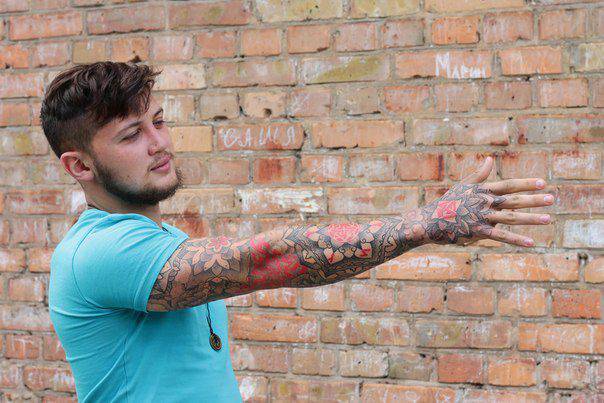
The director went into politics
11 May 2014. 37-year-old Oleg Sentsov (for that period) was detained by security officers. This is the oldest and most remarkable of the participants in the "case of the Crimean terrorists." About him, perhaps, should be said separately. Oleg Gennadievich Sentsov was born on July 13 1976 of the year in Simferopol. From 1993 to 1998 Sentsov studied at the Kiev State Economic Institute, but did not become an economist. He went into business, opened a computer club in his hometown, and in 2011 he decided to try himself in the craft of a film director. The first, debut, Sentsov film turned out to be extremely successful - “Gamer” was dedicated to a subject close to the director - the life of a gamer guy who finished second in the world championship. Despite the fact that shooting the film cost only 20 thousands of dollars, and the actors who acted in it played for free, the picture was a success unprecedented for such a work. First sold-out at the Simferopol cinema "Cosmos", which was packed with people who wanted to watch the movie. Then success at the Rotterdam Film Festival, awarding the prize to the Guild of film scholars and film critics at the festival in Khanty-Mansiysk, a special diploma 3 of the Odessa International Film Festival, an award at the film festival in Truskavets in May 2012. directing. In July, 2013, he began to make the film "Rhino" - about the children of "dashing nineties." In contrast to the debut film, 1 million dollars was spent on “Rhino”, and the Ukrainian government, the same Yanukovych, allocated 43%.
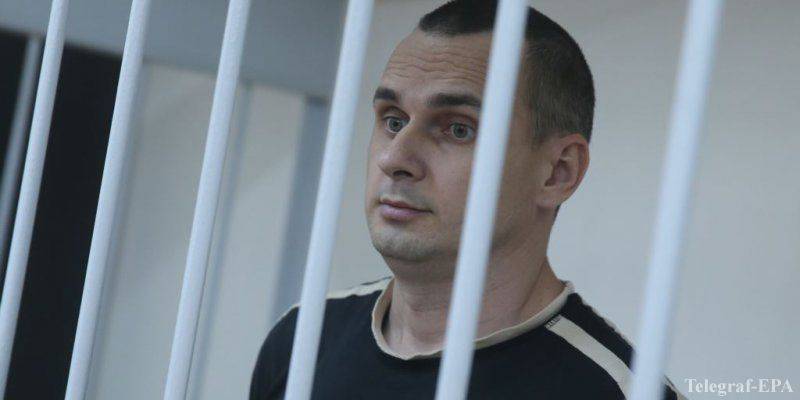
However, the director's fame Sentsov was not enough, and he went into politics. Criticize the very Ukrainian government, which has allocated funds for the film. During the events of the fall of 2013, Oleg Sentsov became an activist of Avtomaydan. Recall that Avtomaydan was a group of activists of Euromaidan on cars that were engaged in the implementation of various instructions of Euromaidan - from picketing to hunting for unwanted ones. Among the most well-known actions of Avtomaydan are picketing the residences of key politicians from the team of Viktor Yanukovych, government buildings, patrolling Kiev in cars at night, in order to identify the "aunts" as Maidan supporters contemptuously called their political opponents. Night Kiev during the events on the Maidan patrolled from 10 to 200 Avtomaydan cars. Automaidan acted in the Crimea. After Crimea reunited with Russia, Avtomaydan’s activists continued their activities for some time. Oleg Sentsov was among them. Why he decided to move to more radical actions is unknown. Sentsov himself denied his participation in the organization of the terrorist community, and if to make assumptions, it is possible that he acted on the direct instructions of higher-level persons from Kiev. After the arrest of Sentsov, his children - the 12-year-old daughter and the 9-year-old son, whom the director brought up without a mother, were forced to take custody of his sister. According to the testimony given by Aleksey Chirniy and Gennady Afanasyev, it was “Oleg from Avtomaydan” that was the organizer of the group and the initiator of the incriminated acts. Like the other arrested, Sentsov was transported from Simferopol to Moscow to the Lefortovo detention facility under the jurisdiction of the Federal Security Service. It is in this isolation cell that dangerous state criminals, major corrupt officials, foreign spies and terrorists are kept.
Anarchist nicknamed "Tundra"
16 May 2014, in broad daylight, on Simferopol’s Boulevard in Simferopol, an operation was conducted to arrest another suspect in the preparation of terrorist acts. FSB officers arrested 23-year-old (for that period) Alexander Kolchenko. He was born 26 in November 1989 in Simferopol and received the specialty of a tourism manager, but earned money with the simplest working profession - a loader. Loader Kolchenko was a fairly well-known person in the Crimean social movement. And quite remarkable, even against the background of other suspects. First, Kolchenko did not sympathize with Ukrainian nationalism, but adhered to completely opposite views - he was an anarchist, anti-fascist and internationalist. In the radical left circles Kolchenko was known under the nickname "Comrade Tundra." Tundra participated in numerous actions of the Crimean anarchists and anti-fascists - including pickets in memory of lawyer Stanislav Markelov killed in Moscow and journalist Anastasia Baburova, in actions of a social orientation - supporting trolleybus drivers, campaigning against the introduction of paid education and for university self-government. In February, 2014, he protested against the Chinese company building a large port on the Crimean coast. In general - a typical representative of the modern left radical movement. Before the events on the Maidan, people like Kolchenko (pictured) and activists of the Right Sector and other Ukrainian national-radical organizations would be irreconcilable enemies.
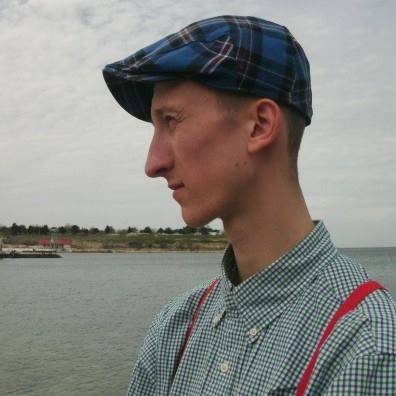 However, the events on the Maidan showed that in the modern world, the ideologies of the twentieth century and their interrelations in the historical past fade into the background. Among the crowds of youth gathered in the center of the Ukrainian capital for a protest rally, there were not only representatives of Ukrainian right-wing organizations such as “Tryzub Stepan Bandera”, UNA-UNSO and “Right Sector”, but also left radicals - anarchists, Trotskyists, left-wing socialists. For the last, Maidan seemed to be a kind of romantic revolution that overthrew the power of corrupt officials and oligarchs. The hatred of such activists towards the government came to the point that in the barricade frenzy they were ready to stand shoulder to shoulder with their yesterday's worst enemies - Ukrainian fascists from right-wing radical organizations. Some of the anarchists and leftists of Maidan subsequently went to fight in the East - as part of the volunteer battalions created and staffed, mostly Nazis.
However, the events on the Maidan showed that in the modern world, the ideologies of the twentieth century and their interrelations in the historical past fade into the background. Among the crowds of youth gathered in the center of the Ukrainian capital for a protest rally, there were not only representatives of Ukrainian right-wing organizations such as “Tryzub Stepan Bandera”, UNA-UNSO and “Right Sector”, but also left radicals - anarchists, Trotskyists, left-wing socialists. For the last, Maidan seemed to be a kind of romantic revolution that overthrew the power of corrupt officials and oligarchs. The hatred of such activists towards the government came to the point that in the barricade frenzy they were ready to stand shoulder to shoulder with their yesterday's worst enemies - Ukrainian fascists from right-wing radical organizations. Some of the anarchists and leftists of Maidan subsequently went to fight in the East - as part of the volunteer battalions created and staffed, mostly Nazis. But, one should pay tribute to the Ukrainian left, most of them still retained common sense and refused to support the new Ukrainian government. Sympathized with anarchism, Salim Salkin, the leader of the Day of Triffids group, became the author and performer of the Anthem of Donbass and many other songs in support of the militia of New Russia. As part of the Donetsk and Lugansk armed groups appeared communist groups, staffed by both local left-wing activists and volunteers from other countries of the former Soviet Union and even abroad, supporting communist, socialist and anarchist ideas. The left was in Odessa during the famous tragedy, a number of communists became part of the governing bodies of the Donetsk and Lugansk people's republics. Therefore, Alexander Kolchenko and those of his comrades in the movement that were in the company of Ukrainian nationalists, on the side of the new Kiev authorities, rather became exceptions among the left and left-radical movement of Ukraine, which, on the whole, retained political adequacy.
The investigation and the first sentences
Investigative actions in the case of the “Crimean terrorists” were carried out by the investigating authorities of the Federal Security Service of the Russian Federation. All persons involved in the criminal case were transferred from Simferopol to Lefortovo SIZO in Moscow. According to investigators, 2014 arrested in April created a “terrorist community”, which allegedly aimed at “influencing the decision-making bodies of the state authorities of the Russian Federation to withdraw the Republic of Crimea from its structure”. The leadership of Simferopol activists, according to investigators, was carried out by the Ukrainian “Right Sector”. As it is known, participation in terrorist activities can be punished, according to Russian legislation, with very impressive terms of imprisonment. Two of the Simferopol radicals preferred to make a deal with the investigation and get less time. Gennady Afanasyev was the first to judge 2014 in December. His case was dealt with in a special order - yet frank confession, repentance and cooperation with the investigation. 25 December 2014 The Lefortovo District Court of Moscow sentenced Gennady Afanasyev to seven years in prison with a sentence being served in a strict regime colony.
Next came the turn of Alexey Chirniya. Unlike Afanasyev, his case was referred to Rostov-on-Don. Like Afanasyev, Chirniy admitted his actions, repented and agreed to cooperate with the investigation. 21 on April 2015 in the North-Caucasian District Military Court began the process of a criminal case against a citizen of Ukraine Alexei Chirniy. Since the defendant concluded a pre-trial agreement, the public prosecutor appealed to the judge with a petition to appoint the defendant the minimum sanctions provided for by the incriminated articles. But 12’s years of imprisonment, on the whole, ran into them. However, the court went to the meeting of the prosecution and the accused. The consideration of the Chirniya case took only one day and on the evening of 21 on April 2015. Alexey Chirniy was sentenced to seven years in prison with a sentence being served in a high-security penal colony. That is, he received the same punishment as the other repentant - Gennady Afanasyev.
Sentsov - Kolchenko process
The most difficult was the trial of Oleg Sentsov and Alexander Kolchenko. The fact is that, unlike Afanasyev and Chirniya, they did not admit their guilt and refused to cooperate with the investigation. Moreover, a massive campaign was launched in support of Sentsov and Kolchenko in the Ukrainian, Russian and international liberal media. The charges on which the Simferopol "terrorists" were to be convicted were called none other than falsified, and Sentsov and Kolchenko themselves were defined as political prisoners. Another 15 of May 2014. The Ministry of Foreign Affairs of Ukraine expressed outrage at the detention of director Oleg Sentsov and demanded his immediate release. 19 May 2014 with the demand for the release of Oleg Sentsov to the Federal Security Service of the Russian Federation appealed the Russian Kinosoyuz. Also, the release of Sentsov was demanded by the National Union of Cinematographers of Ukraine, the Confederation of Unions of Cinematographers of the CIS and Baltic States, and the European Film Academy. Pickets demanding the release of Oleg Sentsov, Alexander Kolchenko and other detainees were held in Kiev, Odessa and Lviv - in front of the Russian Embassy and Consulates of the Russian Federation. The human rights organization Amnesty International, which is considered to be the main organization supporting political prisoners and prisoners of conscience, came out on the side of those arrested. In order to influence the Russian justice, the defenders of the arrested attracted to their side a number of world-class cinema stars. Thus, the call for a transparent investigation of Sentsov’s case and his release in the absence of clear charges was signed by such famous film directors as Pedro Almodovar, Wim Wenders, Agnieszka Holland, Mike Lee, Krzysztof Zanussi, Andrzej Waid, Ken Loach. The request of the head of the National Union of Cinematographers of Ukraine Sergey Trimbach for the release of Sentsov, addressed to Vladimir Putin, was even joined by Nikita Mikhalkov. In early July, 2015, demanding the immediate release of Alexander Kolchenko, Oleg Sentsov, Nadezhda Savchenko and other citizens of Ukraine, the OSCE Parliamentary Assembly addressed the leadership of the Russian Federation. Kolchenko’s defense, in turn, was made by numerous left-radical organizations, including the Trotskyist Russian Socialist movement and the libertarian Autonomous Action. Trying to justify their like-minded people, the libertarians of the Autonomous Action in an appeal in support of Kolchenko wrote: “Sasha adheres to the position of internationalism and anti-fascism, for which he has been repeatedly attacked by ultra-right militants. For example, on January 19, 2012, after the film screening of the film about Anastasia Baburov, he and his friend were attacked by 30 by the nationalists who used the cold weapon».
However, requests from artists and international organizations could not affect Russian justice. 12 June 2015. The criminal case of Oleg Sentsov and Alexander Kolchenko was sent for consideration on the merits to the North-Caucasian District Military Court - to Rostov-on-Don. Representatives of the Prosecutor General’s Office announced that “Oleg Sentsov created a terrorist community that operated on the territory of the Republic of Crimea and was a structural subdivision of the Right Sector organization (its activity was banned by the court in Russia), the goals of which were to destabilize the authorities of the republic and influence the adoption decisions by the authorities of the Russian Federation on the withdrawal of this republic from its composition. Members of the terrorist community from April to May 2014 of the year committed two acts of terrorism in Simferopol: the arsons of the offices of the public organization Russian community of Crimea and the Crimean regional branch of the United Russia political party. In addition, they were preparing to blow up a monument to Lenin, located on Lenin Boulevard in Simferopol ”(quoted in: Dunaev A. Crimean director accused of terrorism, will be judged in Rostov // http://161.ru/text/newsline /44157175582720.html). After it became known about the upcoming trial of Sentsov and Kolchenko in Rostov-on-Don, a representative of the local branch of the Left Front movement turned to the court with a request to allow him to act as a public defender of Kolchenko, but his request was rejected. Sentsova's cousin Natalia Kochneva was denied a similar request. 9 July 2015. The trial of Sentsov and Kolchenko, taking place behind closed doors, began in Rostov-on-Don. Oleg Sentsov was accused of creating and leading a terrorist community, and Alexander Kolchenko of participation in a terrorist community. Not without scandal. 31 July 2015, specially triggered from Moscow to Rostov-on-Don, Gennady Afanasyev, one of the main witnesses in the case, stated that he had slandered Sentsov and Kolchenko because he testified under pressure. At the same time, Afanasyev did not refuse from his participation in the acts for which he was convicted. However, the trial continued.
25 August 2015 g. North Caucasian District Military Court of Rostov-on-Don convicted Ukrainian citizens Oleg Sentsov 1976 b. and Alexander Kolchenko, born 1979 Oleg Sentsov was found guilty on all points of his criminal case. For the creation of a terrorist community and leadership of a terrorist community, Oleg Sentsov was given 15 years of imprisonment, for a terrorist act against the office of the Russian community of Crimea - 10 years of imprisonment, for a terrorist act against the office of the United Russia party - 11 years of imprisonment, for preparing a terrorist act (explosion of a monument to VI Lenin in Simferopol) - 7 years in prison, for attempting to acquire explosive devices - 5 years in prison, for illegal possession of weapons and ammunition on the stock ve organized group - 5 years imprisonment. By partial addition of punishments (the practice used in the Russian Federation), the court appointed Oleg Sentsov a punishment of 20 years of imprisonment with serving a sentence in a strict regime colony. Alexander Kolchenko was found guilty of participating in a terrorist community and participating in one terrorist act - the arson of the party office. For participation in the terrorist community, Kolchenko was sentenced to 6 years of imprisonment, for participation in a terrorist act - 8 years of imprisonment. By partial addition of punishments, Alexander Kolchenko was sentenced to 12 years of imprisonment with a sentence being served in a high-security penal colony.
Immediately after the announcement of the sentence, the defendants shook each other's hands. As it became known later, they had even made a bet earlier on the expected length of the prison sentence - and they guessed their terms. After that, when the judge asked the defendants whether the verdict was clear to them, Sentsov and Kolchenko, who had risen from their seats, began to sing the Ukrainian anthem. At this time in the hall stood the relatives of the defendants and Ukrainian diplomats who were present at the announcement of the verdict, including the consul of Ukraine in Rostov-on-Don Alexander Kovtun. Dmitriy Dinze, Oleg Sentsov’s lawyer, told journalists after the trial that the defendants would appeal to the Supreme Court of the Russian Federation, however, the lawyer himself admitted that there was a small probability of satisfying this appeal and said that he hopes that the Kolchenko and Sentsov exchanges any Russian citizens who are currently in prison in Ukraine. Oleg Sentsova's sister, Natalia Kochneva, gave the trial a unflattering description, comparing it with the processes of the Stalinist repressions. According to Natalia Kochneva, Western countries can compile the following Sentsov-Kolchenko sanctions list, similar to the Magnitsky list.
Reaction in the West and in Russia
After the announcement of the verdict to the “Crimean terrorists”, comments from Russian and foreign politicians, public figures, cultural figures began to arrive. The Ministry of Foreign Affairs of Ukraine expressed a strong protest over the condemnation of the citizens of Ukraine Alexander Kolchenko and Oleg Sentsov, demanding their immediate release. Petro Poroshenko said that he would seek the release of Kolchenko and Sentsov in the framework of peace agreements. A sharp condemnation of the sentence was made, of course, by the US State Department. 26 August 2015 The EU Foreign Minister Federica Mogherini described the conviction of Sentsov and Kolchenko as contrary to international law and accepted standards of justice. German Human Rights Commissioner Christoph Strasser stated that he was extremely concerned about the severity of the court sentence against Alexander Kolchenko and Oleg Sentsov, and urged Russia to follow the norms of international law and thoroughly investigate possible violations during the trial. Not left aside and the community of filmmakers. Thus, the director of the Warsaw Film Festival, Stefan Laudin, called Sentsov "a martyr of freedom and justice," and British director Michael Lee described the verdict as "tragedy and shame."
The Ministry of Foreign Affairs of the Russian Federation, refusing to comment on the verdict itself and intervene, thus, in the sovereignty of the courts, called the reaction of foreign countries to the verdict too politicized. The head of the presidential administration, Sergey Ivanov, refused to comment on the sentencing. A representative of the Donetsk People's Republic called the conviction or release of Sentsov and other persons charged in the territory of Russia an internal affair of Russian justice. Among Russian political figures, writer Eduard Limonov expressed his most enthusiastic support for the verdict of Sentsov. Recall that a famous writer himself in the past, when he was the leader of the National Bolshevik Party of Russia, was sentenced to 4 years in prison. Initially, Limonov and his comrades were incriminated in an attempt to invade Kazakhstan in order to protect the local Russian-speaking population, but the sentence was pronounced under the article “illegal possession of weapons”. However, Limonov did not show a feeling of "prisoner solidarity" towards the representative of the anti-Russian forces. In his Twitter, Eduard Limonov wrote: “Sentsov was given 20 years. Right! The man who called the Russians the occupiers of the Crimea deserves a twenty, a freak! Ukraine 23 was raping the Crimea. ” ““ My principle: every enemy of Russia is my enemy. Therefore, Sentsov, Savchenko, and liberal leaders — Navalny, etc., and Ekho Moskvy — are enemies. What is simpler! ", - the writer said on his page, and continued -" "We conquered the Crimea under Catherine, and Ukraine sshakhrayvstvovoval it from us, idiot Yeltsin-drunkard. Let Sentsov sit for the stolen Russian good. ” For different categories of the Russian population, Eduard Limonov and his political activities can cause mixed reactions, but we must pay tribute that it was the “Limonovtsy” twenty years ago, when the Russian leadership did not even think about reuniting Crimea with Russia, demanded that Ukraine give Russia the territory of the peninsula . In 1999, in Sevastopol, a famous action “Sevastopol - Russian city” was held. 24 August 1999, on Ukraine’s Independence Day and exactly sixteen years before the sentencing of Sentsov and Kolchenko, a group of 15 activists from the National Bolshevik Party of Russia barricaded themselves in the tower of the Seaman’s Club in Sevastopol and chanted the slogans “Kuchma, choke on Sevastopol!” “Sevastopol is a Russian city!” Scattering leaflets from the tower. Ukrainian special forces arrived at the storming of the tower. The arrested "natsbolov" was placed in the Ukrainian pre-trial detention centers, where they spent six months - without court sentences. And only then they were transferred to Russia, where they were released directly from the transfer prison. However, the events of those old years, when Russian citizens had to spend half a year in prisons for an absolutely peaceful action, not for arson or preparing an explosion, modern liberal human rights activists prefer not to recall.
Meanwhile, the case of the “Crimean terrorists” is far from the only example of the struggle of the Crimean law enforcement agencies against the activists of the Ukrainian radical nationalist organizations active in the region. So, in June 2015, a criminal case under the h. 1 Art. 282 of the Criminal Code of the Russian Federation (incitement of hatred or enmity on the basis of attitudes towards a social group, committed using mass media) was instituted against Stanislav Krasnov. According to law enforcement, this man is an activist of the radical organization “Right Sector” and has repeatedly made appeals aimed at inciting hatred and enmity towards the residents of Crimea who have taken Russian citizenship. 15 May 2015 was convicted Alexander Kostenko - a member of the riots in Kiev, causing injury to a special unit "Berkut". He was accused of committing crimes under section “b” of part 2, article XXUMX (intentional infliction of minor bodily harm), part xNUMX, article XXUMX of the Russian Criminal Code (illegal acquisition, possession and carrying of the main parts of firearms). Kostenko was sentenced to 115 years 1 months of imprisonment with serving a sentence in a penal colony.
The severe sentence of Sentsov and Kolchenko was testimony to the resolute attitude of the Russian justice against those accused of crimes against Russia related to the “Ukrainian theme”. Meanwhile, the beginning of the process of the case of Nadezhda Savchenko, which will also take place in the Rostov region, is also expected in the near future. Ukrainian pilots are accused of killing Russian journalists. The trial of Savchenko will be held in the city of Donetsk, Rostov region, which is very symbolic. Despite the fact that Savchenko’s lawyers filed a motion to transfer the court to another city, explaining their dissatisfaction with the alleged dangers for the defendant in a city located on the Russian border with the belligerent Donbass, the Rostov Regional Court found their arguments unconvincing and left Donetsk as a place of trial . The case of Nadezhda Savchenko is even more “promoted” than the case of the “Crimean terrorists”. Recall that Petro Poroshenko conferred the title of Hero of Ukraine to the woman, the navigator, the country's highest government award, and the Ukrainian government and the media continue to officially accuse Russia of abducting citizen Savchenko and falsifying the charges. Nevertheless, given the harsh sentences imposed on Sentsov and Kolchenko, it can be assumed that in the case of Savchenko, Russian justice, if its guilt is really proven, will not show excessive humanism and impose severe punishment. The well-known Russian political scientist Mikhail Remizov, commenting on the sentences of Sentsov and Kolchenko in an interview with the newspaper "Vzglyad", said that "what is imputed to Sentsov, looks quite plausible, but as a first attempt at sabotage. Therefore, such a harsh sentence looks like a demonstrative act with an eye to other possible wishing for a sabotage war "(quoted in: http://www.vz.ru/politics/2015/8/25/763000.html).
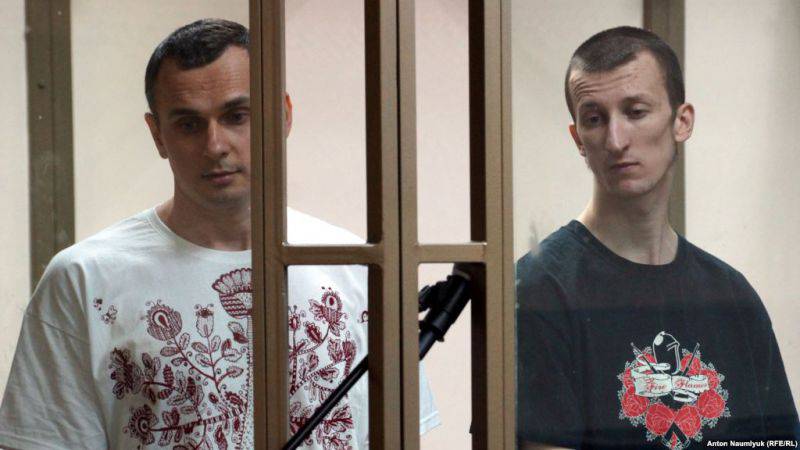
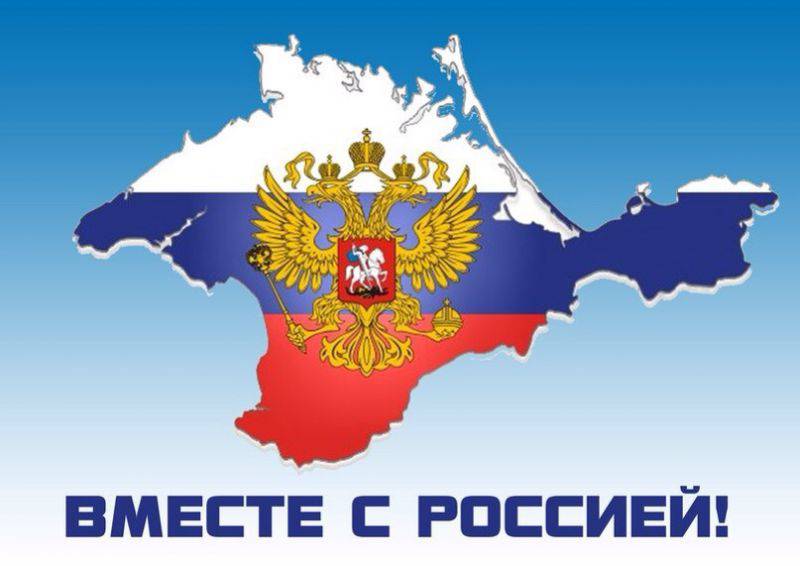
Information